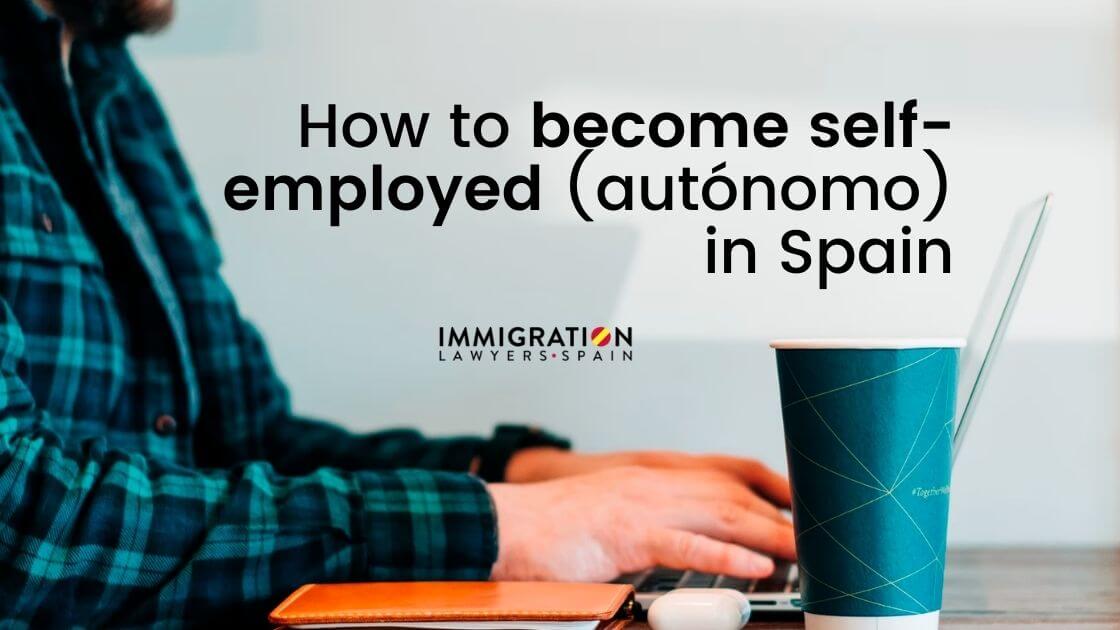
Are you a foreigner and would like to start providing your services in Spain independently as an “autónomo”? Then this article is for you. You will find the step-by-step legal process to register as a freelancer, the complete list of requirements you must meet, where to carry out each step of the process, and a series of tips that will be very useful to enjoy an easy registratioin.
Content
ToggleWhat is an "autónomo" or freelancer in Spain?
An autónomo in Spain is a self-employed worker or freelancer, a professional who provides services independently to his or her clients.
That is, it is a person who, instead of working for a company in exchange for a salary, works on her own in exchange for the remuneration paid to him by her direct clients.
This is the case, for example, of many cab drivers, professionals who are dedicated to the world of digital marketing, physiotherapists who have their own clinic, etc.
Together with the incorporation of a company, it is one of the two ways to develop a business activity in Spain.
Thus, any foreigner in Spain can register as self-employed and work under this regime.
However, depending on your country of origin, the procedure and requirements may be more or less complex:
- If you are from a European Union country, the process is very easy and straightforward. You will just have to obtain your green card or EU registration certificate, and with this document, you will be able to work as a freelancer.
- However, if you are from outside the EU, the process is longer and more tedious, as you must first obtain a self-employed work permit (as we will now see), which entails much more requirements.
Then, let’s take a look at the step-by-step process you will need to follow to complete this autónomo registration.
But before we get started with the process, remember that you can ask our expert immigration and business lawyers anything:
How do I become self-employed in Spain?
Below you will find the 5 steps that any foreigner must follow in order to legally become a freelancer in the Spanish territory.
As you will see, this process involves registration with two main institutions:
- The Social Security
- The Tax Agency
Let’s analyze the process step by step.
Obtaining a work permit and NIE
In order to develop your economic activity in Spain as an independent professional (self-employed), you will need a work permit and an NIE (foreigners identification number).
And this will be the first step in the whole process.
Here you can find an article where with all the details to obtain this residency, but what’s next is a summary of the requirements you will have to meet to get this permit.
- First of all, you must not have criminal records
- You cannot be in an irregular situation in Spain (in fact, the process is initiated from your country of origin).
- You must have sufficient academic training and related professional experience to carry out your professional activity as a freelancer.
- You must present a business plan defending the viability of your project, as well as stating the planned investment (which must be sufficient) to guarantee its success; in addition to demonstrating that your project will promote the Spanish economy and create employment in the country.
- Fill in and complete the application form EX-07, which you can download here.
Once you submit all the necessary documentation at the Spanish consulate located in your country of origin and get a favorable response, you will get your visa stamped in your passport to enter Spain in a period not exceeding 30 days.
Once you enter the country, you will be able to register your fingerprints and pick up your TIE (foreigner identification card) which will contain the NIE.
And it will be from then onwards, already with a valid residency card, when you can complete the rest of the registration procedures as a self-employed worker.
Request your digital certificate or get a cl@ave
Nowadays, a large part of the necessary procedures to complete the registration as a self-employed can be completed online.
Thus, you can decide to continue the process as has traditionally been done (in person) or do everything online. The decision is yours, since both options are equally valid.
If you want to follow the latter route, you will need your digital certificate or the cl@ave system (both options are valid).
These are digital signatures that will allow you to communicate with the Tax Agency and the Social Security online (the two institutions you will have to register with, as we will now see), sign, and upload documents to their platforms.
Here you can find an article with the complete process to get your digital certificate.
Register with the Social Security
The next step requires going to the Social Security offices to register with them so that you can start making contributions.
That is to say, monthly payments to this organism (that when you work for a company with a payroll are deducted directly from your salary) in order to be able to receive benefits in the future, such as unemployment or retirement benefits.
*If you have a digital certificate, this procedure can be done online through the Social Security’s website.
You must fill in the TA 0521 form to register in the RETA (Special Regime for Self-Employed Workers). There are different versions of this regime, so it will be important to check which one corresponds to you.
In addition, you must bring your bank certificate to set up a direct debit for the monthly self-employed fee (i.e., define where you want your monthly contributions to be paid).
If you register for the first time as self-employed, you can benefit from an initial flat rate for which you will only pay 60€ per month during the first year, and for the following 12 months, you will have certain bonuses.
In this step of the process, you will be asked to be identified with your NIE or green card, and your passport (with a photocopy of it).
Finally, you will have to select an insurance company for any accidents or quick procedures, such as maternity leave (or similar). Although, obviously, you can go to any hospital or public medical center if you prefer.
And with that you will be assigned a social security number, which will stay with you during your whole life in Spain.
Visiting the Tax Agency
After registering with the Social Security, you will have a maximum of 60 days to register with the Tax Agency, notifying that you are starting your professional activity as a freelancer.
In other words, you will register with the AEAT in order to start paying your taxes as independent professional.
For that, you will have to download and fill out Model 037 (a simplified version of the 036 model that in the case of being self-employed will be much easier for you) in which you will complete your activity, professional sector, etc.
These procedures can be carried out with the help of one of the PAE points (points of help to the entrepreneur).
"IAE" registration
Finally, you must register in the corresponding IAE (Economic Activities Tax).
That is to say, you must register in the group that corresponds to your professional category so that the tax authorities can register what type of economic activity you are going to carry, hence taking into consideration the services to be provided and therefore the associated taxes.
To do this, you must select the epigraph that corresponds to your economic activity. You can find your epigraph here.
Keep in mind that you can register in as many IAE as necessary according to your activity.
And that’s all!
Start performing your professional activity and paying taxes
Once you have completed the previous step, you will be able to start providing your services as a freelancer. Day-to-day operations will begin.
However, this does not end here.
After the registration, and on a quarterly basis, you will have to make your VAT declarations. It will be very important that you keep a record of all invoices issued and received to be able to make this declaration correctly.
In addition, once a year you will have to formalize your IRPF (personal income tax) declaration with all the particularities of being self-employed.
Here you can find a complete guide including all taxes self-employed workers must pay in Spain.
Being up to date with your tax obligations is essential, both to avoid penalties and to be able to renew your residence and work permit.
Hence, if you want to avoid any kind of inconvenience while saving yourself headaches and gaining greater comfort, contact our team of expert lawyers to start receiving the legal advice you need.
Get in touch with our lawyers and let us guide you step by step:





